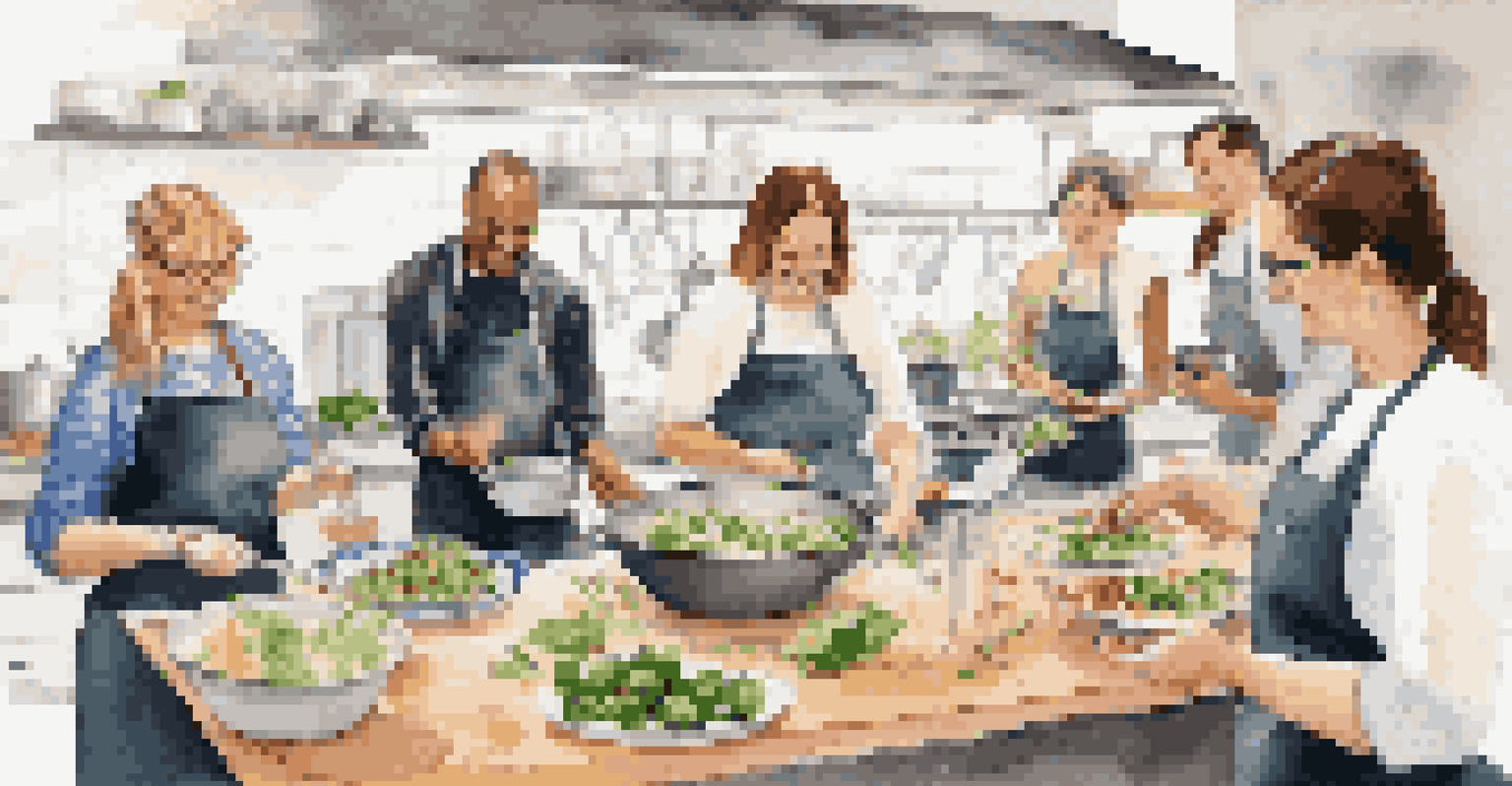The Role of Culinary Medicine in Enhancing Quality of Life

What is Culinary Medicine and Its Importance
Culinary medicine is an emerging field that blends the art of cooking with the science of nutrition and medicine. It focuses on using food as a tool to improve health and prevent disease, making it a bridge between culinary skills and medical knowledge. By understanding how different foods affect our bodies, we can make informed choices that enhance our overall quality of life.
Let food be thy medicine and medicine be thy food.
Imagine this: instead of just seeing food as fuel, culinary medicine encourages us to view it as a powerful ally in our health journey. This perspective shifts the way we think about our meals, making us more mindful about what we eat and how it impacts our well-being. By incorporating culinary medicine into our lives, we can transform our relationship with food into one that promotes healing and vitality.
Moreover, culinary medicine empowers individuals to take charge of their health. With the right knowledge and skills, we can create delicious meals that not only satisfy our taste buds but also support our health goals. This holistic approach emphasizes prevention and wellness, showing that what we put on our plates can significantly influence our life quality.
Culinary Medicine and Chronic Disease Management
Chronic diseases such as diabetes, heart disease, and obesity are on the rise, and culinary medicine offers a promising solution. By focusing on nutrition and food choices, patients can manage their conditions more effectively. For instance, a diet rich in whole grains, fruits, and vegetables can help lower blood sugar levels and cholesterol, making it a vital part of managing these diseases.

Think of culinary medicine as a toolkit for health; it equips patients with the knowledge to prepare meals that are not only nutritious but also tailored to their specific health needs. This personalized approach can lead to better adherence to dietary recommendations and improved health outcomes. When people feel empowered to cook for their health, they often see significant changes in their well-being.
Culinary Medicine Enhances Health
Culinary medicine combines cooking and nutrition to empower individuals to make food choices that improve health and prevent disease.
Furthermore, culinary medicine promotes a community-oriented approach to health management. Cooking classes and workshops can foster social connections, allowing individuals to share experiences and learn from one another. This sense of community can enhance motivation and provide support, making the journey toward better health less isolating.
The Psychological Benefits of Culinary Medicine
Beyond physical health, culinary medicine also addresses mental well-being. Engaging in cooking can be a therapeutic process, allowing individuals to express creativity and relieve stress. The act of preparing a meal can be meditative, providing a sense of accomplishment and satisfaction that boosts mood.
The food you eat can be either the safest and most powerful form of medicine or the slowest form of poison.
Consider how cooking with loved ones can create lasting memories and strengthen relationships. Sharing meals together fosters connection and can combat feelings of loneliness or isolation. This social aspect of culinary medicine not only nourishes the body but also feeds the soul, enhancing overall quality of life.
Moreover, learning about nutrition and cooking can instill a sense of purpose and control over one's health. When individuals understand the benefits of what they eat, they are more likely to make healthier choices. This knowledge can lead to improved self-esteem and a more positive outlook on life, demonstrating that culinary medicine is about more than just food.
Integrating Culinary Medicine into Daily Life
Integrating culinary medicine into our daily routines doesn’t have to be overwhelming; small changes can make a big impact. Start by incorporating more whole foods into your diet, such as fruits, vegetables, and lean proteins. Simple swaps, like choosing brown rice instead of white or adding leafy greens to your meals, can enhance nutritional value without sacrificing flavor.
Meal planning is another effective way to embrace culinary medicine. By planning your meals for the week, you can ensure that you have the right ingredients on hand and reduce the temptation to opt for less healthy options. This proactive approach not only saves time but also encourages mindful eating habits.
Chronic Disease Management Tool
This approach provides personalized dietary strategies that help manage chronic diseases like diabetes and heart disease.
Additionally, consider taking a cooking class focused on healthy cuisine. These classes can provide valuable skills and knowledge, making cooking enjoyable and accessible. By learning new recipes and techniques, you can expand your culinary repertoire while prioritizing your health.
The Role of Education in Culinary Medicine
Education is a cornerstone of culinary medicine, as understanding nutrition is vital for making informed food choices. Cooking classes, workshops, and online resources can provide essential knowledge about healthy eating patterns and the benefits of various foods. This education empowers individuals to make changes that positively impact their health.
Moreover, healthcare providers are increasingly recognizing the importance of culinary medicine and its role in patient education. By incorporating nutrition counseling into their practices, doctors can help patients understand how food affects their health. This collaborative approach fosters a supportive environment where patients feel encouraged to make healthier choices.
Additionally, schools and community organizations are beginning to embrace culinary medicine initiatives, teaching children and families about nutrition and cooking from an early age. By instilling these values in the next generation, we can create a culture that prioritizes health and well-being for years to come.
Culinary Medicine and Food Accessibility
Food accessibility is a significant concern in many communities, and culinary medicine seeks to address this issue. By promoting the use of local, seasonal ingredients, culinary medicine encourages individuals to explore affordable options within their reach. This focus not only supports health but also fosters a connection to the community and local economy.
Community gardens and farmers’ markets can serve as valuable resources for those looking to incorporate culinary medicine into their lives. These initiatives often provide fresh produce at lower prices, making it easier for individuals to access nutritious food. By supporting these local efforts, we can help create a more equitable food system.
Community and Education Matter
Culinary medicine emphasizes the importance of education and community support in promoting healthy eating habits and food accessibility.
Moreover, culinary medicine advocates for policy changes that prioritize food access and nutrition education. By raising awareness about the importance of healthy eating, we can push for initiatives that ensure everyone has the resources to make nutritious choices. This collective effort can lead to healthier communities and improved quality of life for all.
Future Directions of Culinary Medicine
As culinary medicine continues to evolve, its potential to transform health and wellness is immense. Future directions may include the integration of technology, such as apps that provide personalized meal plans based on health data. These advancements can make it even easier for individuals to manage their diet and health effectively.
Additionally, research into the relationship between food and health is likely to expand, providing more evidence for the benefits of culinary medicine. As we gain a deeper understanding of how nutrition impacts various conditions, we can continue to refine our approaches to cooking and eating for health.

Finally, the continued collaboration between healthcare providers, chefs, and nutritionists will be essential in promoting culinary medicine. By working together, these professionals can create comprehensive programs that address individual needs and preferences, ensuring that culinary medicine remains accessible and effective for everyone.